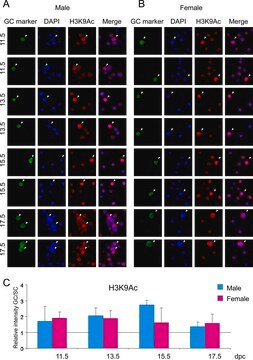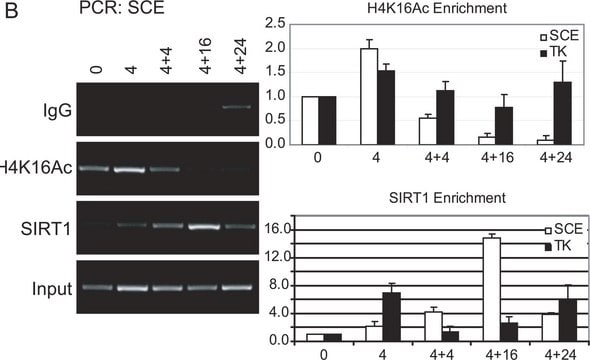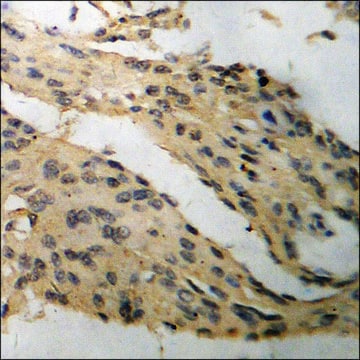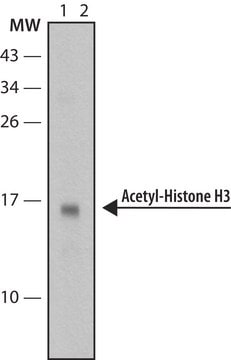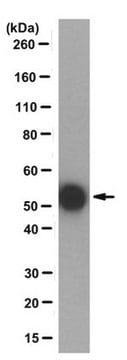04-119
Anti-acetyl-Histone H4 (Lys12) Antibody, rabbit monoclonal
culture supernatant, from rabbit
Synonym(s):
H4K12Ac, Histone H4 (acetyl K12)
About This Item
Recommended Products
biological source
rabbit
Quality Level
antibody form
culture supernatant
antibody product type
primary antibodies
clone
monoclonal
species reactivity
human, vertebrates
manufacturer/tradename
Chemicon®
Upstate®
technique(s)
ChIP: suitable
dot blot: suitable
western blot: suitable
isotype
IgG
NCBI accession no.
UniProt accession no.
shipped in
wet ice
target post-translational modification
acetylation (Lys12)
Gene Information
human ... H4C1(8359)
Specificity
Immunogen
Application
Sonicated chromatin prepared from HeLa cells (1 X 10E6 cell equivalents per IP) were subjected to chromatin immunoprecipitation using either 2 µL of Negative Control Supernatant, or 2 µL of Anti-Acetyl-Histone H4 (Lys12) and the Magna ChIP A Kit (Cat. # 17-610).
Successful immunoprecipitation of Acetyl-Histone H4 (Lys12)-associated DNA fragments was verified by qPCR using ChIP Primers, human GAPDH Coding Region as a positive locus, and a gene desert region as a negative locus. (Figure 2). Data is presented as percent input of each IP sample relative to input chromatin for each amplicon and ChIP sample as indicated.
Please refer to the EZ-Magna ChIP A (Cat. # 17-408) or EZ-ChIP (Cat. # 17-371) protocol for experimental details.
Western Blot Analysis:
Lysates from HeLa cells untreated or sodium butyrate treated (Lanes 1 and 2 respectively) were resolved probed with anti-acetyl-Histone H4 (Lys12) (1:1,000). Arrow indicates Acetyl-Histone H4 (Lys12).
Arrow indicates Acetyl-Histone H4 (Lys12) (~11 kDa)
Epigenetics & Nuclear Function
Histones
Chromatin Biology
Quality
Target description
Physical form
Storage and Stability
Legal Information
Disclaimer
Not finding the right product?
Try our Product Selector Tool.
Storage Class Code
12 - Non Combustible Liquids
WGK
WGK 1
Flash Point(F)
Not applicable
Flash Point(C)
Not applicable
Certificates of Analysis (COA)
Search for Certificates of Analysis (COA) by entering the products Lot/Batch Number. Lot and Batch Numbers can be found on a product’s label following the words ‘Lot’ or ‘Batch’.
Already Own This Product?
Find documentation for the products that you have recently purchased in the Document Library.
Our team of scientists has experience in all areas of research including Life Science, Material Science, Chemical Synthesis, Chromatography, Analytical and many others.
Contact Technical Service
